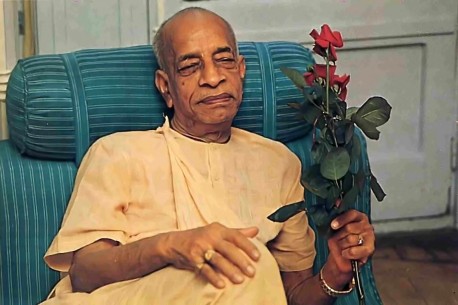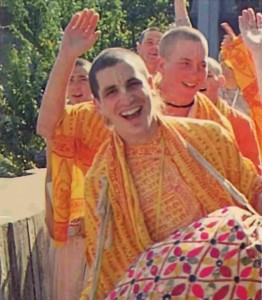Atheist-existentialist Jean-Paul Sartre writes that because man wants to be God but cannot, he is a “useless passion” in a universe that has no purpose—and thus, he is always in anxiety. “That is foolishness,” says His Divine Grace A.C. Bhaktivedanta Swami Prabhupada. “You are not God but God’s servant…. Sartre believes the universe has no purpose because he is blind. He has no power to see that there is a plan. We are trying to introduce Krishna consciousness in order to make the world into a place where there is no anxiety.”
 Hayagriva dasa: Jean-Paul Sartre, perhaps the most famous philosopher of this century, calls himself an “atheistic existentialist.” He sees man as having been thrown into the world and abandoned. For him. God is dead.
Hayagriva dasa: Jean-Paul Sartre, perhaps the most famous philosopher of this century, calls himself an “atheistic existentialist.” He sees man as having been thrown into the world and abandoned. For him. God is dead.
Srila Prabhupada: God is not dead, nor has He abandoned us. If you feel abandoned, it is because you have done something that has brought about this condition. If you rectify your position, you will again feel accepted. Now you are condemned to the material world. But just because you are condemned, you should not think that God is also condemned. God is always in Vaikuntha [the spiritual world]. God is not dead.
Hayagriva dasa: In any case, having defined himself as an atheistic existentialist, Sartre denies God’s existence—particularly the existence of a personal God. Sartre wants to set aside the whole question of God’s existence and place emphasis on man, on “human reality.”
Srila Prabhupada: But the question of God’s existence is the main question of philosophy. God has created everything—your mind, intelligence, and body, and the circumstances surrounding you. How can you deny His existence? In the Vedic literatures it is stated that in the beginning God existed, and the Bible also states that in the beginning there was God. In this material universe, existence is temporary. According to the laws of material nature, the body is created on a certain day, it exists for some time, and is then eventually finished. Similarly, the entire cosmic manifestation has a beginning, a middle, and an end. But before the creation of the cosmos, who existed? If God did not exist, how could the creation be possible?
Hayagriva dasa: Sartre would not admit the existence of an originator for the creation. He would say that man simply exists, he turns up, appears on the scene.
Srila Prabhupada: A person appears due to his father and mother. How can this be denied? Does Sartre mean to say, “I appeared all of a sudden—I dropped from the sky”? Only a fool would say that he appeared without parents. From our experience we can understand that all species of life are manifest from some mother. Taken as a whole, the mother is material nature. And as soon as the mother is accepted, the father, God, must also be accepted.
Why shouldn’t God exist? If you believe in your existence, why not believe in the existence of God? There are 8,400,000 different species existing in multifarious forms. According to the Vedic understanding. God is also a living being, but He is different from all others in that He is the chief—the supreme living being. According to the Bhagavad-gita [7.7], mattah parataram nanyat: “There is no living being superior to God.” We all experience that there are beings more intelligent than us. And God has the ultimate intelligence. Why can’t a person who exceeds all others in intelligence exist? There is no question of “if God exists.” God must exist. In the shastras [scriptures] He is described as the superlative personality, the super-powerful and super-intelligent being. We can see that everyone in the world is factually not on an equal level: there are varying degrees of perfection. This indicates that there is a superlative person, and if we go on searching for the person with the greatest wealth, intelligence, power, beauty, or whatever, we will find that God possesses all these qualities in the superlative degree and that every other living entity possesses them in degrees relative to Him. How, then, can we rationally deny God’s existence? Actually, Sartre’s proposal means that he does not want God to exist.
Hayagriva dasa: According to Sartre, because there is no God to conceive of human nature, the first principle of existentialism is that “man is nothing else but what he makes of himself…. Existentialism’s first move is to make every man aware of what he is and to make the full responsibility of his existence rest on him.” It is this very responsibility—this freedom to change himself and the world—that overwhelms modern man with anguish and anxiety.
Srila Prabhupada: This means that modern man is in an awkward position. He wants peace, but he does not know how to attain it. Peace is not possible for a man in ignorance, but this does not mean that peace is impossible. You are certainly responsible for your own life, so why not take the responsibility to transfer yourself to a safe place where there is no anxiety? Now you do not know of such a place, but there might be such a place, so why not ask someone who knows? Why constantly remain disappointed and anxious? The safe place where there is no anxiety is called Vaikuntha. The very word Vaikuntha means “no anxiety.”
Hayagriva dasa: Sartre believes that men could live together peacefully if they assumed responsibility not only for themselves but for others as well.
Srila Prabhupada: Suppose I want to benefit you and you are free. Your freedom means that you can accept or reject my good instructions. How can I be responsible for you if you don’t obey me? Sartre claims that we are responsible for others, but if others do not follow our instructions, how can we be considered responsible for them? This is all contradictory. Unless there is some standard knowledge, there must be contradiction. According to the Vedic literatures, God is the supreme person, and we should all be His obedient servants. God gives us some duty, and we are responsible to carry out that duty. Our real responsibility is to God. If we reject God, society becomes chaotic. Religion means avoiding chaos and meeting our responsibility to God by fulfilling our duty. Responsibility rests on us, and it is given by God. If we make spiritual progress by fulfilling our duty, we can finally live with God personally in Vaikuntha.
Hayagriva dasa: Sartre writes, “Since we have discarded God the father, there has to be someone to invent values…. Moreover, to say that we invent values means nothing else but this: life has no meaning a priori. Before you become alive, life is nothing; it’s up to you to give it a meaning, and value is nothing else but the meaning that you choose.”
Srila Prabhupada: Therefore everyone invents his own meaning? If this is the case, how will people live peacefully in society? Since everyone has his own idea of life, there can be no harmony. What kind of government would exist?

Hayagriva dasa: Recently Sartre has turned to Marxism.
Srila Prabhupada: But in communist countries there are very strong governments. It is not possible for people to avoid government or leadership.

Hayagriva dasa: Sartre believes that regardless of the form of government under which men live, the structure of human consciousness is essentially free. What’s more, Sartre maintains that man is condemned to be free—that freedom is a fate which man cannot escape.
Srila Prabhupada: If man is condemned, who has condemned him?
Hayagriva dasa: Sartre would say that man is condemned by accident.
Srila Prabhupada: In other words, it is simply an accident that one person is condemned and another is blessed. It is simply an accident that one person is in jail and another is not. What kind of philosophy is this? Such so-called philosophers simply mislead others. Actually, nothing is accidental. We agree that the living entity is condemned to this material world, but when we speak of condemnation we mean that man has lost his freedom. He is tightly under the control of the material nature. This material world is like a vast sea, and when you are placed into the sea you have no freedom. You move according to the waves. This means that there is a power controlling you. Because you have placed yourself under the control of material nature, you act according to the modes of material nature. Krishna says in the Bhagavad-gita, “The bewildered spirit soul, under the influence of the three modes of material nature, thinks himself to be the doer of activities, which in actuality are carried out by nature” [Bg. 3.27]. Because you are conditioned by the material nature, you are feeling its check—although you think that you are free. When you are thrown into the ocean of material existence, you lose your freedom. However, if you put yourself in better circumstances, you can regain your freedom. Therefore, it is your duty to get yourself liberated by becoming Krishna-conscious.

Hayagriva dasa: Because we are one thing today and something else tomorrow, Sartre says that our essential nature is “nothingness.”
Srila Prabhupada: You are “nothing” in the sense that you are under the full control of a superior power. You are being carried away by the waves of maya [material nature]. In the ocean of maya you may say, “I am nothing,” but actually you are something. Your “somethingness” will be very much exhibited to you when you are put on land, or, in other words, when you become Krishna-conscious. Out of despair you conclude that your nature is “nothingness.” Sartre’s philosophy is a philosophy of despair, and we say it is unintelligent. Despair is the result of ignorance.
Hayagriva dasa: Sartre maintains that although the basis of our nature is nothingness, man chooses or creates his own nature.
Srila Prabhupada: Man’s basic nature is not “nothingness,” but “somethingness.” That “somethingness” is to be an eternal servant of Krishna. Therefore, you should choose to be “something,” not “nothing.” But in order to do that you have to take lessons from a higher personality. Before philosophizing one should learn from a knowledgeable person. That is the Vedic injunction—tad vijnanartham sa gurum evabhigacchet: in order to learn the transcendental science, you must approach a bona fide spiritual master. A person can mold his nature by deciding to serve Krishna, not by dismissing the whole matter out of confusion and disappointment and claiming that man is nothing. The attempt to make life zero is due to a poor fund of knowledge.
Hayagriva dasa: Sartre says that we are constantly choosing or making our life, but that everything ends at death.

Srila Prabhupada: Death simply means changing to another body. The soul, the active principle upon which the body stands, does not die. Death is simply like changing apartments. A sane man can understand this.
Hayagriva dasa: Sartre believes that man’s fundamental desire is the “desire to be.” In other words, man seeks eternal existence rather than mere nothingness.
Srila Prabhupada: That is so. Because man is eternal, he has the desire to exist eternally. He is seeking eternal, spiritual life. Unfortunately, he puts himself under certain material conditions that are not eternal, and he must suffer repeated birth and death. Nothing in the material world exists eternally. A tree may exist for ten thousand years, but eventually it will perish. In the material world, nothing abides. But in the Bhagavad-gita [8.20] Krishna speaks of another world, which is permanent (sanatana). After the annihilation of this material universe, that spiritual world will abide. Through the practice of Krishna consciousness one can attain his eternal position in that spiritual world.
Hayagriva dasa: Sartre writes that man’s fundamental desire is the desire to be God.
Srila Prabhupada: This is more or less impersonal, Mayavada philosophy. The Mayavadis believe that when they attain complete knowledge, they become God. Because man is part and parcel of God, he wants to be united with God. It is like a man who has been away from home for a long time. Naturally he wants to go home again.
Hayagriva dasa: Sartre maintains that this attempt to be God is bound to fail.
Srila Prabhupada: Certainly, because man is not God. His very desire to be God means that he is not God at the present moment. And if he once was God, how has he become something else? No. If man could become God, there would be no question of his ever being something other than God. There would be no question of being ignorant. Another name for Krishna is Acyuta. The word acyuta means “He who never falls down.” This means that God never becomes non-God. God is God always. So it is not that one can become God through some mystic practice. A man cannot become God, but he can become godly. When we are in darkness, we desire light and come into the sunshine. But this does not mean that we become the sun. Similarly, when we come to the platform of perfect knowledge, we become godly, but we do not become God.
Hayagriva dasa: Because Sartre knows that man’s attempt to become God is futile, he calls man a “useless passion.”
Srila Prabhupada: A man is not useless if he attempts to be Krishna-conscious. The attempt to be Krishna-conscious and the attempt to be Krishna are totally different. One is godly, and the other demonic.
Hayagriva dasa: Sartre then reasons that because it is impossible to become God, everything else is useless.
Srila Prabhupada: That is foolishness. You are not God but God’s servant. You have chosen to attempt to become God, but you have found this to be impossible. Therefore you should give up this notion and decide to become God’s servant. That is the proper decision.
Hayagriva dasa: Sartre concludes that since things have no reason to exist, life has no essential purpose.
Srila Prabhupada: That is nonsense. Everything has a purpose. Nothing can exist without a purpose, because there is a supreme cause for everything. The defect in such philosophers is that they do not have sufficient brain substance to go further than what they superficially see. They are not capable of understanding God, the cause of all causes. Many modern scientists also maintain that nature, prakrti, is the sole cause of existence, but we do not subscribe to such a theory. We understand that God is behind nature and that nature is not acting independently. Nature is phenomena, but behind or beyond nature is noumena. God, Krishna.
In the Bhagavad-gita [16.8] philosophy like Sartre’s is called demonic: “The demons say that this world is unreal, that there is no foundation, and that there is no God in control. The world is produced of sex desire and has no cause other than lust.” Demons do not believe in a superior cause. They consider that everything is accidental. They say that a man and a woman unite accidentally, and a child is simply the result of sex. They claim that there is no purpose to existence. This type of philosophy is called demonic because it is of the nature of darkness and ignorance, and because it denies the existence of God.
Hayagriva dasa: Sartre writes that because man is free he is susceptible to what Sartre calls “bad faith.” This bad faith is a kind of self-deception—a failure to take responsibility for one’s life. Through bad faith one loses his freedom.
Srila Prabhupada: Certainly you have limited freedom to choose, but if you act irresponsibly you must suffer. Responsibility and freedom go hand in hand. So we must use discrimination. Without discrimination our freedom is blind—we cannot understand right or wrong.
Hayagriva dasa: For Sartre, bad faith means to avoid making decisions. A man in bad faith simply drifts from day to day without being involved, without making responsible decisions.
Srila Prabhupada: That means he has decided to drift. His drifting is a decision.
Hayagriva dasa: Sartre believes that bad faith must be replaced by a solid choosing and by faith in our choice. For instance, if one chooses a certain path of action, he must have the faith to carry out that action valiantly and heroically. Then he will be doing the right thing.
Srila Prabhupada: But if he makes the wrong decision, what is the value in his action? Moths fly very valiantly and courageously into the fire. Is that a very good decision? … Sartre speaks of bad faith, but what about good faith?
Hayagriva dasa: If bad faith is the avoidance of decisions, then good faith would mean making decisions courageously and following them up, regardless of what the decisions are.
Srila Prabhupada: But what if your decision is wrong?
Hayagriva dasa: For Sartre, there is no question of right or wrong.
Srila Prabhupada: Then whatever decision I make is final and absolute? This means that the insect’s decision to enter the fire is the proper decision. This is the philosophy of insects.
Hayagriva dasa: Sartre’s philosophy has been called pessimistic because he maintains that man is a “useless passion” vainly striving in a universe without a purpose.
Srila Prabhupada: Sartre may be a useless passion, but we are not. No sane man is useless. A sane man will follow a superior authority. Tad vijnanartham sa gurum evabhigacchet: “If one approaches a bona fide spiritual master, he will not be bewildered.” That is Vedic civilization. Sartre believes the universe is without a purpose because he is blind. He has no power to see that there is a plan. We are trying to introduce Krishna consciousness in order to make the world into Vai-kuntha, into a place where there is no anxiety. But our decision is not blind. It is the decision of a higher authority—Krishna—and therefore it is perfect.


Leave a Reply